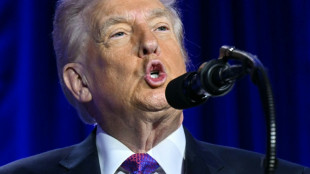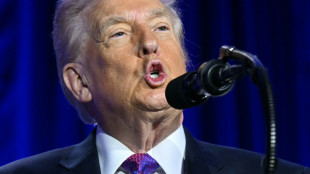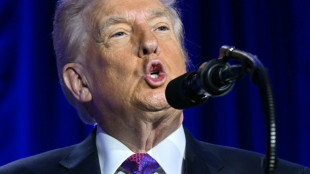
-
 Faheem blitz sees Pakistan avoid Netherlands shock at T20 World Cup
Faheem blitz sees Pakistan avoid Netherlands shock at T20 World Cup
-
Trump refuses to apologize for racist clip of Obamas as monkeys

-
 Takaichi talks tough on immigration on eve of vote
Takaichi talks tough on immigration on eve of vote
-
England's Salt passed fit for T20 World Cup opener

-
 Spain, Portugal brace for fresh storm after flood deaths
Spain, Portugal brace for fresh storm after flood deaths
-
Pakistan bowl out Netherlands for 147 in T20 World Cup opener

-
 Pushed to margins, women vanish from Bangladesh's political arena
Pushed to margins, women vanish from Bangladesh's political arena
-
Crypto firm accidentally sends $40 bn in bitcoin to users

-
 Pistons end Knicks' NBA winning streak, Celtics edge Heat
Pistons end Knicks' NBA winning streak, Celtics edge Heat
-
Funerals for victims of suicide blast at Islamabad mosque that killed at least 31

-
 A tale of two villages: Cambodians lament Thailand's border gains
A tale of two villages: Cambodians lament Thailand's border gains
-
Police identify suspect in disappearance of Australian boy

-
 Cuba adopts urgent measures to address energy crisis: minister
Cuba adopts urgent measures to address energy crisis: minister
-
Not-so-American football: the Super Bowl's overseas stars

-
 Trump says US talks with Iran 'very good,' more negotiations expected
Trump says US talks with Iran 'very good,' more negotiations expected
-
Trump administration re-approves twice-banned pesticide

-
 Hisatsune leads Matsuyama at Phoenix Open as Scheffler makes cut
Hisatsune leads Matsuyama at Phoenix Open as Scheffler makes cut
-
Beyond the QBs: 5 Super Bowl players to watch

-
 Grass v artificial turf: Super Bowl players speak out
Grass v artificial turf: Super Bowl players speak out
-
Police warn Sydney protesters ahead of Israeli president's visit

-
 Bolivia wants closer US ties, without alienating China: minister
Bolivia wants closer US ties, without alienating China: minister
-
Ex-MLB outfielder Puig guilty in federal sports betting case

-
 Milan-Cortina Winter Olympics open with dazzling ceremony
Milan-Cortina Winter Olympics open with dazzling ceremony
-
China overturns death sentence for Canadian in drug case

-
 Trump reinstates commercial fishing in protected Atlantic waters
Trump reinstates commercial fishing in protected Atlantic waters
-
Man Utd can't rush manager choice: Carrick

-
 Leeds boost survival bid with win over relegation rivals Forest
Leeds boost survival bid with win over relegation rivals Forest
-
Stars, Clydesdales and an AI beef jostle for Super Bowl ad glory

-
 Dow surges above 50,000 for first time as US stocks regain mojo
Dow surges above 50,000 for first time as US stocks regain mojo
-
Freeski star Gu says injuries hit confidence as she targets Olympic treble

-
 UK police search properties in Mandelson probe
UK police search properties in Mandelson probe
-
Bompastor extends contract as Chelsea Women's boss despite slump

-
 Milan-Cortina Winter Olympics open with glittering ceremony
Milan-Cortina Winter Olympics open with glittering ceremony
-
A French yoga teacher's 'hell' in a Venezuelan jail

-
 England's Underhill taking nothing for granted against Wales
England's Underhill taking nothing for granted against Wales
-
Fans cheer for absent Ronaldo as Saudi row deepens

-
 Violence-ridden Haiti in limbo as transitional council wraps up
Violence-ridden Haiti in limbo as transitional council wraps up
-
Hundreds protest in Milan ahead of Winter Olympics

-
 Suspect in murder of Colombian footballer Escobar killed in Mexico
Suspect in murder of Colombian footballer Escobar killed in Mexico
-
Colombia's Rodriguez signs with MLS Minnesota United

-
 Wainwright says England game still 'huge occasion' despite Welsh woes
Wainwright says England game still 'huge occasion' despite Welsh woes
-
WADA shrugs off USA withholding dues

-
 France detects Russia-linked Epstein smear attempt against Macron
France detects Russia-linked Epstein smear attempt against Macron
-
Winter Olympics to open with star-studded ceremony

-
 Trump posts, then deletes, racist clip of Obamas as monkeys
Trump posts, then deletes, racist clip of Obamas as monkeys
-
Danone expands recall of infant formula batches in Europe

-
 Trump deletes racist video post of Obamas as monkeys
Trump deletes racist video post of Obamas as monkeys
-
Colombia's Rodriguez signs with MLS side Minnesota United

-
 UK police probing Mandelson after Epstein revelations search properties
UK police probing Mandelson after Epstein revelations search properties
-
Russian drone hits Ukrainian animal shelter


'Good boy!' Dogs do understand us, says new study
Whether dogs truly understand the words we say -- as opposed to things like tone and context clues -- is a question that has long perplexed owners, and so far science hasn't been able to deliver clear answers.
But a new brain wave study published Friday in Current Biology suggests that hearing the names of their favorite toys actually activates dogs' memories of the objects they are associated with.
"It is not so self-evident that dogs would know what a 'ball' is," co-author Lilla Magyari of the Eotvos Lorand University in Hungary, told AFP, using an easy example to explain the motivation behind the research.
With a couple of famous exceptions, dogs have fared poorly on lab tests requiring them to fetch objects after hearing their names, and many experts have argued it isn't so much what we say but rather how and when we say things that pique our pooches' interest.
Yelling "Go get the stick!" and having a dog successfully bring the object back doesn't conclusively prove they know what the word "stick" means.
Even scientists who concede that dogs do pay attention to our speech have said that, rather than really understanding what words actually stand for -- a uniquely human trait -- they are reacting to particular sounds with a learned behavior.
- Brain waves -
In the new paper, Magyari and colleagues applied a non-invasive brain imaging technique to 18 dogs brought to their lab in Budapest.
The test involved taping electrodes to the dogs' heads to monitor their brain activity. Their owners said words for toys they were most familiar with -- for example "Kun-kun, look, the ball!" -- and then showed them either the matching object or a mismatched object.
After analyzing the recordings, the team found different brain patterns when dogs were shown matching versus mismatched objects.
This experimental setup has been used for decades in humans, including babies, and is accepted as evidence of "semantic processing," or understanding meaning.
The test also had the benefit of not requiring the dogs to fetch something in order to prove their knowledge.
"We found the effect in 14 dogs, which shows the effect that we see on a group level is not only driven by a few exceptional dogs," co-author Marianna Boros told AFP.
- Case closed? -
Holly Root-Gutteridge, a dog behavior scientist at the University of Lincoln in England, who wasn't involved in the research, told AFP the ability to fetch specific toys by name had previously been deemed a "genius" quality.
She noted the famous border collies Chaser, who had the largest tested memory of any non-human animal, and Rico, who was the first dog found in tests to retrieve toys by their names.
But Root-Gutteridge said the new study "shows that a whole range of dogs are learning the names of the objects in terms of brain response even if they don't demonstrate it behaviorally," adding it was, "another knock for humanity's special and distinct qualities."
The paper "provides further evidence that dogs might understand human vocalizations much better than we usually give them credit for," added Federico Rossano, a cognitive scientist at UC San Diego.
But not all experts were equally enthusiastic.
Clive Wynne, a canine behaviorist at Arizona State University, told AFP he was "split" on the findings.
"I think the paper falls down when it wants to make the big picture claim that they have demonstrated what they call 'semantic understanding,'" he said, though he praised the "ingenious" experimental setup as a new way to test the full extent of dogs "functional vocabulary."
For example, Wynne said, he needs to spell out the word "w-a-l-k" when he's in front of his dog -- lest his pet get excited for an outing there and then -- but he doesn't need to take the same precautions in front of his wife, whose understanding of the word goes beyond simple association.
"Would Pavlov be surprised by these results?" asked Wynne, referencing the famous Russian scientist who showed dogs could be conditioned to salivate when they heard a bell signaling meal time. "I do not think he would be."
G.AbuGhazaleh--SF-PST
